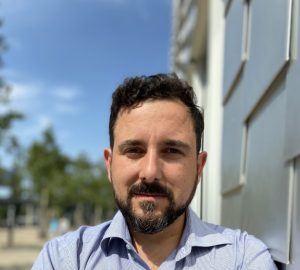Since January 2023, Giovanni Coppa has been heading the Mobility Competence Group at the eco Association together with Martin Kumstel from Uber. We talked to him about his personal mobility patterns, the opportunities and challenges of mobility in the future and his goals as the new Mobility Competence Group Leader at the eco Association.
Giovanni Coppa is responsible for the Data Centre and Cloud Innovation divisions at WOBCOM GmbH, a subsidiary of Stadtwerke Wolfsburg AG. As coordinator of the ASTRID Innovation Hub (iHub), he takes the lead in the topics of artificial intelligence, cybersecurity and distributed IoT systems.
You have been heading the eco Mobility Competence Group together with Martin Kumstel from Uber since January. When it comes to your own mobility patterns: How do you usually get to work or to external professional appointments?
Giovanni Coppa: In both my private and professional life, I travel frequently by train and public transport. For example, I have recently been to Austria on business and travelled by train, but I rarely fly. I cover about 90 per cent of my mobility by train and public transport, and where neither is possible, I use my car.
Has the mobility of the future already arrived in Germany? Where do we currently stand?
Giovanni Coppa: On the one hand, we have a multitude of mobility offers, but on the other hand, the places where the offers should be available in theory often do not correspond to reality. This can lead to intermodality not being at all usable – for example, if a rental car is not available at the main railway station.
Another challenge is that the booking process of a transport service is very different from provider to provider and sometimes highly complex. In my view, what is lacking above all is a good user experience. In answer to the question: How can I use a service and an offer quickly and easily – without complex registration processes, complicated booking access and without causing the user to feel that he or she first has to register in some kind of exclusive club? As I see it, many offers fail because providers don’t care enough about what the customer wants, namely to be moved from A to B. Companies fail, from my view, because they don’t focus on the user experience and customer needs in their offers.
Modern mobility is interconnected, digital and intermodal. For this to happen, cities, municipalities, mobility providers and the Internet industry must cooperate, even across national borders. What is the significance of data for the mobility of the future and what challenges and opportunities does it present?
Giovanni Coppa: The interconnection of the mobility industry and the sharing of data can create innovative and intelligent products and services for the mobility of the future. In my field of action, the first thing we do is distinguish between data and information. What we need is information, because information is what interests me as a customer. For example, important information in intermodular transport systems relates to delays. Let’s assume: A train is 10 minutes late, I need this information as a customer. This information in turn is generated by data, which we then convert into information in a business use case. I can give this data an additional attribute, for example whether it is safe and trustworthy because it comes from a validated source. As a customer, I will evaluate the information on the display on the platform “Train 10 minutes late” as more reliable than the information that is displayed to me via my mobile phone, because I can see it on the spot and I assume that Deutsche Bahn can provide its display with reliable information better than any data that is generated, collected and processed in turn. What matters is not only who generates the data, but also the quality of the data and how we process the data. This means that these security and trust aspects must always be considered from the very outset.
Sharing and exchanging data is essential for an intermodal mobility ecosystem. My data is often useful for others to generate a use case, but the idea is not to place a limit on it, but to consider which data I can still use in the exchange to generate use cases for myself. We have achieved this in Wolfsburg with a SmartCity App involving other private companies. Here we have developed an Open Digital Platform (ODP) as an IoT data hub. With the ODP – which acts as the basis for a variety of data analyses and AI-based applications – as context-related information, we have created a technical solution to automate the collection of data information from diverse data silos, all of which have their justification. We bring this into corresponding consolidated and reusable and transferable data models. This then enables SmartParking solutions for customers, for example, through which they can book parking spaces in the app, receive information on the availability of e-charging stations and conveniently book the entire parking and charging process in advance.
What themes would you like to promote as head of the Mobility Competence Group?
Giovanni Coppa: From my end, an important aspect is to achieve interconnection of all players involved in mobility solutions in Germany and in Europe. I am not only thinking of the manufacturing industry or providers of Mobility-as-a-Service (MaaS) solutions, but also, for example, municipalities, communities and cities that are looking for better mobility solutions or have already implemented best practices.
My main goal would be to create a platform where mobility actors can act together and exchange experiences, for example on use cases, their implementation and benefits, so that others can benefit from the experiences and know-how gained through the project.
Thank you very much for the interview, Mr Coppa!
Further information on the Mobility Competence Group




